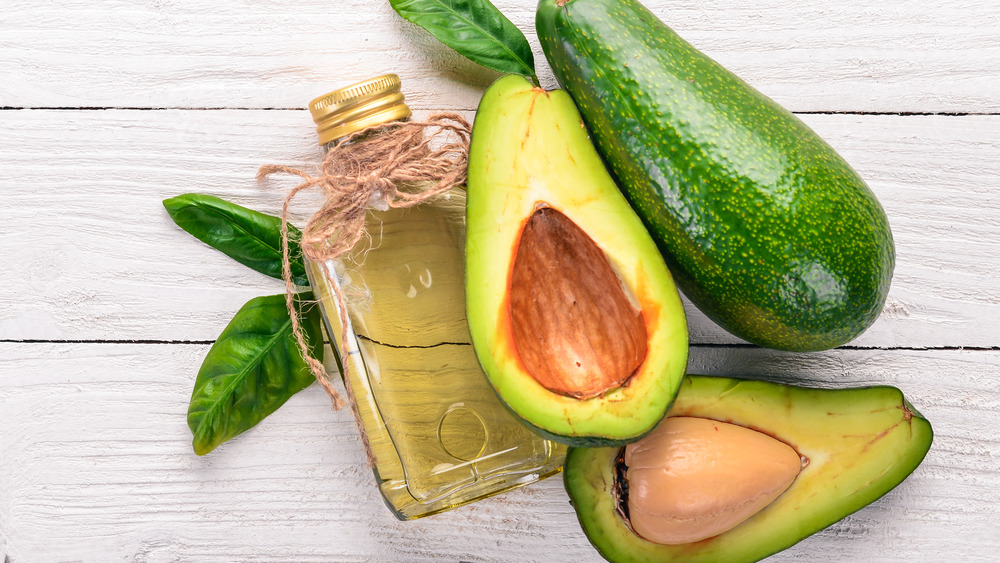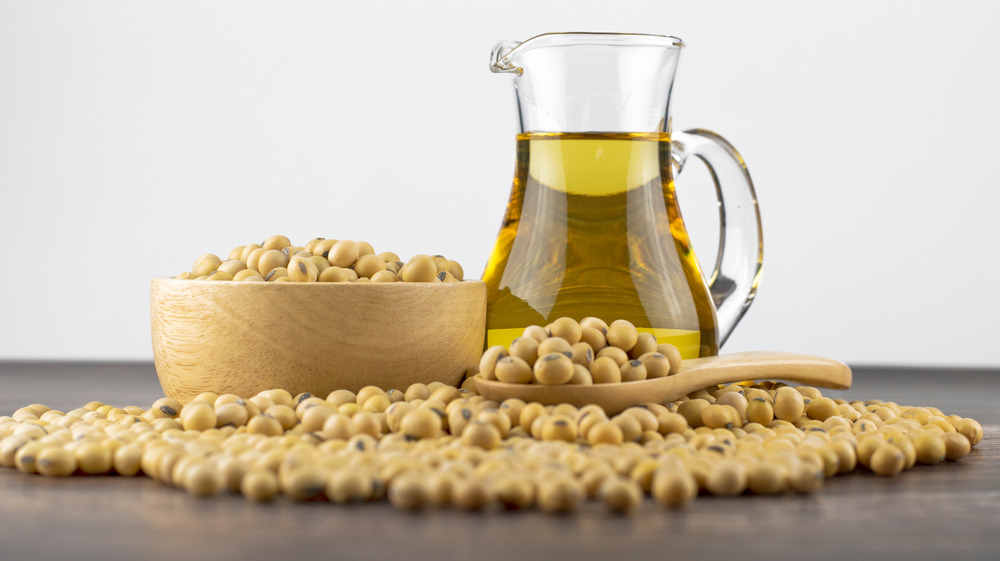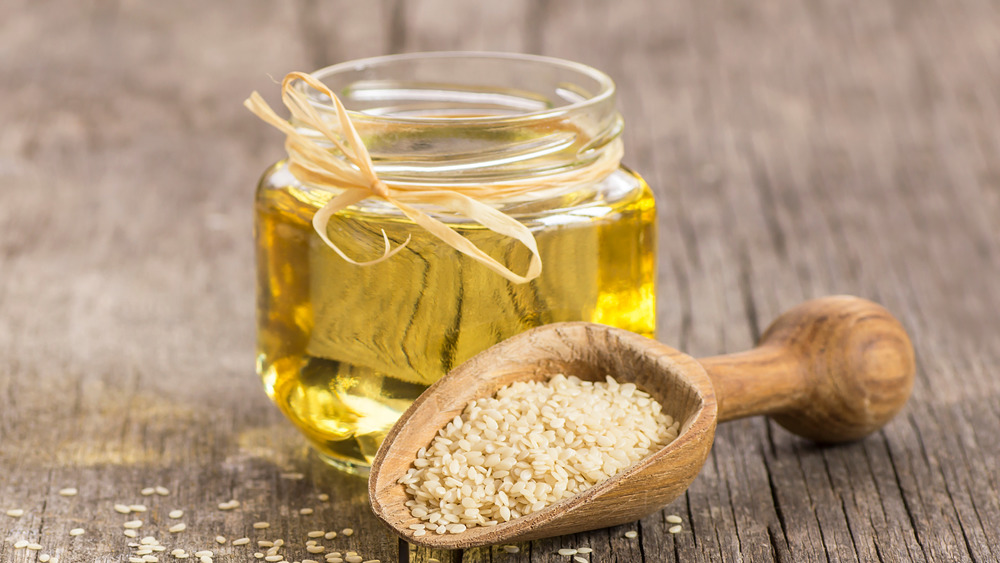7 Oils You Should Be Cooking With And 7 To Avoid
You have plenty of oil options to use when sautéing, baking, and preparing meals. Some oils, like olive oil and vegetable oil, are well known, while others like sunflower oil you may not know a too much about. Figuring out which oil is better to use depends on what type of meal you are preparing, the flavor you are looking for, and even your health preferences.
When you are cooking, you might also want to think about the smoke point of the oil. This is the point at which the oil starts burning and smoking (via Cleveland Clinic). Different oils have different smoke points, and some are better for cooking at higher temperatures. And according to the Cleveland Clinic, the more refined an oil is, the higher smoke point it has. A higher smoke point oil cooked at a higher temperature can lose flavor and produce toxic fumes and free radicals — both of which can harm your health. If you are wondering which oils are healthier or just all around better to use, keep reading.
Use: Olive oil
Most experts agree olive oil is healthy, and its benefits have been demonstrated by science. A 2017 study published in the journal Circulation of around 300 people with heart disease found aspects of a Mediterranean diet, including using olive oil over other oils, could help HDL cholesterol to work more effectively. HDL is considered "good" cholesterol, and it is responsible for pulling out bad cholesterol that builds upon the walls of blood vessels (via Healthline).
According to the Mayo Clinic, upping your HDL cholesterol can reduce heart damage and disease. Olive oil might offer additional benefits, including decreasing risk for metabolic syndrome, lowering inflammation, reducing cancer risk, and fighting against Alzheimer's disease, according to Healthline.
Drizzle olive oil over a salad or mix it into a salad dressing. Use it in a marinade or with sauces when cooking meats, fish, and vegetables. Or drizzle some after you have finished preparing a meal to add flavor to a favorite dish.
Avoid: Vegetable oil
For years past, doctors recommended patients to consume more vegetable oils to improve their cholesterol levels and heart health. However, newer studies are finding previous links between vegetable oils and heart hearth are not as strong as initially thought. For example, researchers found vegetable oil was associated with an increased risk for heart disease, rather than a decreased risk, in a 2016 study published in The BMJ. In this study, men and women were randomly assigned one of two diets — either a diet that replaced all fats with vegetable oil or a control diet that was "high in saturated fat from animal fats, common margarines, and shortenings."
The researchers found the people consuming the vegetable oil had lower cholesterol levels compared to those who consumed the control diet. However, these results didn't hold after a year, and researchers found that for every 30 mg/dL drop in cholesterol, there was a 22 percent increased risk for death from any cause. It seemed as if those who consumed the animal fats were living longer than those consuming vegetable oils.
Use: Coconut oil (in moderation)
When it comes to high-heat cooking like sautéing and searing, coconut oil might be your best choice. It is made up of about 80 to 90 percent fatty acids, which makes it resistant to heat (via The Nutrition Source). It can be stored at room temperature and can last for months or years without going bad or affecting the taste of food.
As The Nutrition Source, a Harvard publication, highlighted, studies have found that people who include coconut as part of their native diet have the lowest rates of cardiovascular disease. The type of coconut oil used in other parts of the world is also different from the West's more processed variety. And, of course, there are other characteristics of these diets that may play a part.
However, not all studies agree that coconut oil is heart-healthy, according to Healthline. "Although the benefits of coconut oil remain controversial, there is no evidence that a moderate intake of coconut oil is harmful," confirmed the publication. "On the contrary, it may even improve your cholesterol profile, though it's currently unknown whether it has any effects on heart disease risk."
Avoid: Grapeseed oil
Grapeseed oil is often thought to be healthy because it contains high amounts of polyunsaturated fat and vitamin E (via Healthline). But grapeseed oil also contains high levels of omega-6 fatty acids, which research published in the Journal of Nutrition and Metabolism found to be linked to inflammation. While small amounts of omega-6 fatty acids are encouraged by the American Heart Association, it is a good idea to consume them in moderation and as part of a diet that includes omega-3 fatty acids.
According to Healthline, grapeseed oil boasts "significant amounts of vitamin E. One tablespoon provides 3.9 mg of vitamin E, which is 19% of the RDA [recommended daily allowance]." Still, many of grapeseed oil's good effects are overshadowed by its potentially dangerous ones. "Some grapeseed oils may contain potentially harmful levels of polycyclic aromatic hydrocarbons (PAHs), which are known to cause cancer in animals," Healthline continued. If you do decide to use grapeseed oil, make sure you are also eating plenty of foods that bring down inflammation, such as fatty fish and nuts.
Use: Avocado oil
Avocado oil is considered a healthy oil because it is loaded with healthy fats and nutrients. A 2019 review in Molecules found the oil may help manage and prevent numerous conditions, including hypertension and high cholesterol and triglyceride levels.
Avocado oil is a multipurpose oil, with a strong taste and odor. It can be used for cooking and baking and in marinades and salad dressings. It has a high smoke point, which makes it a great option for high-heat cooking, according to The Farmer's Almanac. Plus, "it can withstand high temperatures without breaking down and losing its health benefits as many other oils do," the site explained.
In addition to using avocado oil in your favorite dishes, you can use it as a skin treatment. This is because avocado oil is extracted from the part of the avocado fruit that is rich in linoleic acid, linolenic acid, and oleic acid, a study in the International Journal of Molecular Sciences found. This oil also contains additional nutrients including vitamin E that might offer anti-inflammatory and antioxidant effects to the skin. If you want to use avocado oil on your skin, use it on its own or with another carrier oil like olive oil or coconut oil.
Avoid: Soybean oil
Soybean oil is a kind of vegetable oil made from the seeds of the soybean plant. It is a commonly used oil and found in many foods, including salad dressing and condiments (via Healthline). Because it is hydrogenated, it should be used in moderation. Researchers with the University of California – Riverside found a connection between soybean oil and neurological disorders like anxiety, depression, autism, and Alzheimer's disease (via ScienceDaily).
A 2020 study published in the journal Endocrinology compared mice who were fed three different diets: "soybean oil, soybean oil modified to be low in linoleic acid, and coconut oil." The researchers found significant effects from the soybean oil on the hypothalamus, the part of the brain responsible for many functions, including metabolism, hormone release, and regulating body temperature.
The mice fed the soybean oil had several genes that were not functioning correctly, and nearly 100 other genes were affected. The study's authors suggested these effects could have consequences for brain health and with diseases like autism and Parkinson's disease. "However, it is important to note there is no proof the oil causes these diseases," ScienceDaily noted. Still, it may be best to forgo soybean oil.
Use: Sunflower oil
Sunflower oil comes from the Helianthus annuus plant. It is considered a healthy oil because it contains unsaturated fats, which can be beneficial for heart health (via Today's Dietitian). The US Food and Drug Administration (FDA) has confirmed claims about the benefits to the heart health of oleic acid, found in sunflower oil. The FDA made this determination by conducting a systematic review of studies. Sunflower oil can be used for roasting, stir-frying, and deep-frying because it has a high smoke point (via Medical News Today).
Consumption of sunflower oil can reduce the risk for heart disease because it reduces LDL cholesterol and increases HDL cholesterol levels. One study reported in the Journal of the Academy of Nutrition and Dietetics found adults who ate a diet rich in high oleic sunflower oil for 10 weeks had lower LDL cholesterol and triglyceride levels. In another study, researchers had 24 people with hyperlipidemia consume a diet that included high oleic sunflower oil for eight weeks. At the end of the study, researchers found increases in HDL cholesterol in the people who consumed the sunflower oil.
Avoid: Cottonseed oil
Research has shown cottonseed products contain natural toxins. A 2014 report published in the Scientific Journal revealed the concern has to do with the dangers of gossypol, a substance found in the cotton plant. "High concentrations of free gossypol may be responsible for acute clinical signs of gossypol poisoning which include respiratory distress, impaired body weight gain, anorexia, weakness, apathy, and death after several days," the report revealed. It also connected gossypol to male and female reproductive issues and impaired immune function.
Additionally, cottonseed oil can be considered unhealthy because it is high in saturated fat and only contains small amounts of monounsaturated fat, a healthier fat, according to Healthline. However, cottonseed oil is a polyunsaturated fat — and polyunsaturated fats can help to lower LDL ("bad") cholesterol and increase HDL ("good") cholesterol. Nevertheless, the saturated fat content can have "the opposite effect on cholesterol and increases the risk of heart disease" (via Healthline).
Use: Walnut oil
Walnut oil is made by pressing walnuts. It is loaded with nutrients and antioxidants, unsaturated fatty acids, and polyphenols. Consuming this oil may improve heart health, lower your blood sugar, and reduce your risk for some types of cancer (via Healthline). Additionally, Harvard Health Blog reported on a study which suggested that adding walnuts to your diet could improve blood lipid profiles without affecting body weight or blood pressure.
Adding walnut oil might also help you to fight chronic inflammation throughout your body. The high amounts of polyunsaturated fats, omega-3 fatty acids, and polyphenols might be responsible for reducing inflammation. A study published in the European Journal of Nutrition found that walnut oil can reduce oxidative stress, which refers to an imbalance between harmful free radicals and antioxidants in your body.
Walnut oil also tastes great, with a rich, nutty flavor that compliments meats, salads, pasta, and even desserts. However, it is best to add it just after cooking, as cooking it makes it taste bitter (via The Spruce Eats). You should refrigerate walnut oil to keep it fresh.
Avoid: Canola oil
There has been evidence of negative effects of canola oil, which comes from a modified rapeseed plant, in the body. A significant concern, according to The Nutrition Source, is that canola oil may contain trans fats. And trans fats are known for causing major health issues (via Healthline). Deodorization, a final refining process that is used in all types of vegetable oils, is to blame, Dr. Guy Crosby, adjunct associate professor of nutrition at Harvard, explained. This is the process that gives canola oil its bland taste.
Some of the negative effects to health linked to canola oil are increased inflammation, memory problems, and heart problems, according to Healthline. A rat study reported in 2018 found canola oil releases compounds during heating that can promote and activate inflammatory markers in the body. Another rat study, reported in 2017, found overconsumption of canola oil could also lead to weight gain.
Additionally, canola oil is linked to metabolic syndrome in people who are overweight, according to a study published in 2018 in the journal Nutrients. Metabolic syndrome is a cluster of conditions, including high blood pressure, diabetes, and high cholesterol or triglyceride levels, that can increase the risk for heart disease (via Healthline).
Use: Flaxseed oil
Flaxseed oil comes from ripened flaxseeds that have been cold pressed to retrieve the oil (via Medical News Today). It is also known as linseed oil. Flaxseed oil is loaded with many helpful compounds, including omega-3 fatty acids, fiber, lignans, and minerals like calcium and magnesium, a review in the Journal of Food Science and Technology explained. And according to Harvard Health Letter, flaxseed oil contains a type of omega-3 called alpha-linolenic acid (ALA). As Healthline explained, benefits of ALA include reduced risk for heart disease, type 2 diabetes, and fracture. Walnut oil also contains ALA, but flaxseed oil is "the richest source," according to Harvard Health Letter.
Additionally, one 2016 analysis in Nutrients looked at the anti-inflammatory properties of flaxseed oil and found that it contained compounds that helped slow down the production of C-reactive proteins (proteins that cause inflammation).
Flaxseed oil can be used in cold dishes, but it shouldn't be used in meals that require heating. When it is exposed to heat, it can create dangerous chemicals, Verywell Health revealed.
Avoid: Palm oil
Palm oil is a highly saturated oil derived from the seed of the palm plant. Palm oil is often used for cooking and frying, and it is also found in foods like shortenings and processed foods (think: frozen pizza and packaged bread), according to Harvard Women's Health Watch. As the World Health Organization (WHO) explained, though, the health impacts of palm oil are mixed. "Some studies link consumption of palm oil to increased ischaemic heart disease mortality, raised low-density lipoprotein cholesterol, increased risk of cardiovascular disease and other adverse effects. Other studies show no negative effects or even favourable health outcomes from palm oil consumption," wrote the WHO.
A 2018 systematic review of studies aimed to determine the connection between palm oil consumption and death related to cardiovascular disease. While the evidence for this type of outcome was low, the report's authors suggest these results should be interpreted with caution. Still, it might be a good idea to limit palm oil consumption, especially if you have risk factors of heart disease.
Considering palm oil is in so many foods, it can be hard to eradicate from your diet. When cooking and preparing meals at home, olive oil and avocado oil are better, healthier options.
Use: Sesame oil
Sesame oil is, as you probably guessed, derived from sesame seeds. It has a distinct nutty taste and is considered a healthier alternative to vegetable oils, mostly because of its anti-inflammatory, antioxidant, and antimicrobial properties (via Healthline).
A study published in 2015 in the journal, Acta Medica Iranica, assessed the effect of sesame seeds on inflammation and oxidative stress in people with osteoarthritis (OA). Of the 50 study participants, 25 were given 40 grams of sesame seeds daily and the other 25 were given a daily placebo powder, along with their regular treatments. After two months, researchers found was those who ate the sesame seeds had significant decreases in inflammatory proteins. The study's authors confirmed sesame seeds could be a safe, effective, and complementary treatment for people with OA.
According to Healthline, it is best to use unrefined sesame oil at low to medium heat. The site further added that refined sesame oil can be used for deep frying and stir-frying. Toasted sesame oil, on the other hand, is much more delicate and can be best used for dressings and marinades.
Avoid: Corn oil
Corn oil is a type of vegetable oil that can be found in everything from margarine and salad dressings. It is high in omega-6 fatty acids, made from GMO (genetically modified) corn, is highly refined, and can produce harmful chemicals when it is heated (via Healthline). Corn oil has been linked to increased levels of inflammation and liver damage. And like other vegetable oils, it is linked to heart disease and obesity.
However, canola oil has a high smoke point, which is why it's a popular choice for frying and sautéing. It can also be used in baking and as an ingredient in some kinds of margarine. Nevertheless, the refining process can cause corn oil to become oxidized and because of this, it can increase your risk for certain diseases. According to Healthline, the dangerous compounds that are produced when heating this oil have been linked to health problems that can affect "nerve, hormone, and muscle" functions.















